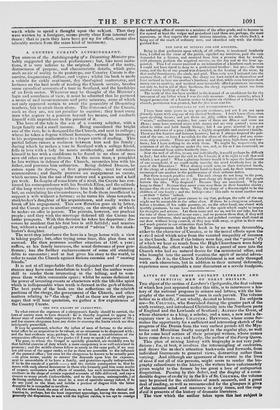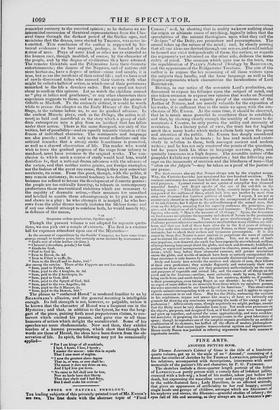LIVES OF THE MOST EMINENT LITERARY AND SCIENTIFIC MEN OF
GREAT BRITAIN.
THE object of the section of Lardner's Cyclopedia, the first volume of which has just appeared under this title, is to interweave a his- tory of the national progress in science and letters, with the bio- graphy of the most "eminent" men in each pursuit. The volume before us is chiefly, if not wholly, devoted to letters. Its subjects are—ST. COLUMBA, who nourished during the greater part of the sixth century, and introduced Christianity into the Northern parts of England and the Lowlands of Scotland ; ALFRED the Great, of whose character as a king, a scholar, and a man, a new and a de- rogatory view is taken; CHAUCER; HEYWOOD, whose name fur- nishes the opportunity for a sufficient and interesting sketch of the progress of the Drama from the very earliest periods till the Mys- teries and Moralities finally merged in the regular play, as well as for some brief notices of their principal writers, whose names have come down to us ; and lastly, the author of the Faery Queen. This plan of mixing history with biography is not very judi- dicious ; for, at best, it involves the intermingling of contraries, and draws the re aler's attention backwards and forwards, from individual lineaments to general views, distracting rather than varying. And although our ignorance of the events in the lives of most if not all of the persons, might seem to render the bio- graphy subordinate to the history, the writers have unfortunately given weight to the former by too great a love of antiquarian disquisition. Passing by this defect, and the display of a consi- derable degree of crocheity in the lie of St. Cosumna, the volume may be praised for the exhibition of much research, and a great deal of reading, as well as recommended for the glimpses it gives of' the national mind and manners in early times, and the coup (Iced it presents of the history of dramatic literature. The view which the author takes upon this last subject is 'somewhat contrary to the received opinion ; as he deduces an uu- isttermitted succession of theatrical representations from the Clas- sical times through the darkest period of the Gothic ages, and maintains that the drama, once started by THESPIS, was never in- to.rnitted. This conclusion of the author is supported by his- torical evidences : its best support, perhaps, is founded in the n tture of man. Plays of some kind or other are as extended as the human race, though modified, of course, by the character of the people, and by the degree of civilization tilt), have attained. The remoter Orientals and the Polynesians have their dramatic entertainments ; the dances of the Negroes, and of nations still more barbarous, have a degree of action—same and simple, it is true, but so are the incidents of their actual life ; and we have read of newly-discoveied tribes who amused, their visiters with what might be called a ballet of action, in which one of their performers mimicked to the life a drunken sailor. But we need not travel about to confirm this opinion. Let us watch the children around us "play at ladies and gentlemen," or any other characters their experience suggests to them, and we may recognize the germs of Othello or Macbeth. To the curiously critical, it would be worth ' while to peruse the chapter on the Early History of the English Stage, in the volume before us, to see its gradual advance. In the earliest Miracle plays, such as the Deluge, the action is al- most; as bald and inartificial as the story which a group of chil- dren extemporize into a play from an incident that has fallen under their notice. There is the same disregard, not only of the unities, but of possibility—and an equally infantile violation (Idle fitness of individual character. The sentiments and language are also puerile ; and it is only in the moral reflections and the satirical remarks that a strong rustic homeliness is perceived, as well as a shrewd observation of life. The reader who would wish to trace the gradual progress of the stage from infancy to manhood, must have recourse to the original works. The con- clusion to which such a course of study would lead him, would doubtless be, that a national drama advances with the advance of the nation, and that neither native genius, nor foreign examples, nor the fashion of the great can cause, though they may somewhat accelerate, its acme. From this point, though, with the public, it may remain stationary, its natural tendency is to decline. The age becomes too refined to favour the development of dramatic genius: the people are too critically knowing, to tolerate in contemporary productions those conventional violations which are necessary to the rapidity of dramatic action,—their manners too smoothed and levelled to enable them advantageously to be put in scenes and shown in a play : he who attempts it is insipid ; he who bor- rows from the older drama merely iniitates the lifeless form; arid if any one should attempt to combine both, lie would merely try, in defiance of the canon,
" ut Serpentes avibus geminentur, tigribus agni."
Though the present volume is not adapted for separate quota- tions, we can pick out a couple of extracts. The first. is a curious bill for expenses attendant upon one of the Mysteries—
In the account of expenditure by theSmiths' Company, we have some items strange enough to modern years, but certainly never dictated by irieveience- " God's coat of white leather (6 skins.) " Cheverel (chevelure, peruke) for God. " Girdle for God.
'Paid to God 2s.
"Item to Herod, 3$. 4d. "; Item to Pilau is wyffe, 2s. " Item to the Devyll and to Judea, 18d." Are among the entries. Those of the Coppers are not less remarkable. •
"Item, payd to Pylate, 4d.
"Item, payd to the 4 knights, 9s. 8d. "Item, paid to the 2 bysshopes, 2s. "Item, payd to God, 20d.
"Item, payd to the Sprytt of God, lfid.
"Item, payd to the two Angelles, 8d.
"Item, payd to the 3 Maryes, 2s.
"Item, payd to the Demon, 16d." The phrase to " outherod Herod" is rendered familiar to us by
SHARSPEARE'S allusion, and the general meaning is intelligible
enough. Its full strength is not, however, so palpable, unless it be known that the character of Ilerod was a frequent one in the Mysteries ; and that, in addition to the tyrant, he was the brag- gart of the piece, putting forth most preposterous claims, to con- trovert which excited his passion, and gave rise to all those
humours of action which delight the uncultivated. Some of his
speeches are mere rhodomontade. Now and then, they exhibit touches of a human presumption, which' show that though the words are those of Herod, the ideas have been drawn from the ob- servation of life. In spirit, the following may yet be occasionally
.applied—
"For I am hinge of all mankinde,
byd, I beate, I lose, I bynde ;
master the moone : take this in nap& That I awe most of mighte.
"1 awe the greatest above degree That is, or was, or ever shall be: The some it dare not shine on me, And I byd him goe down.
"No mine to fall shall now be free, Now no lorde have that liberty That dare abyde and I byd fleey, But I shall make his crowne."



























 Previous page
Previous page